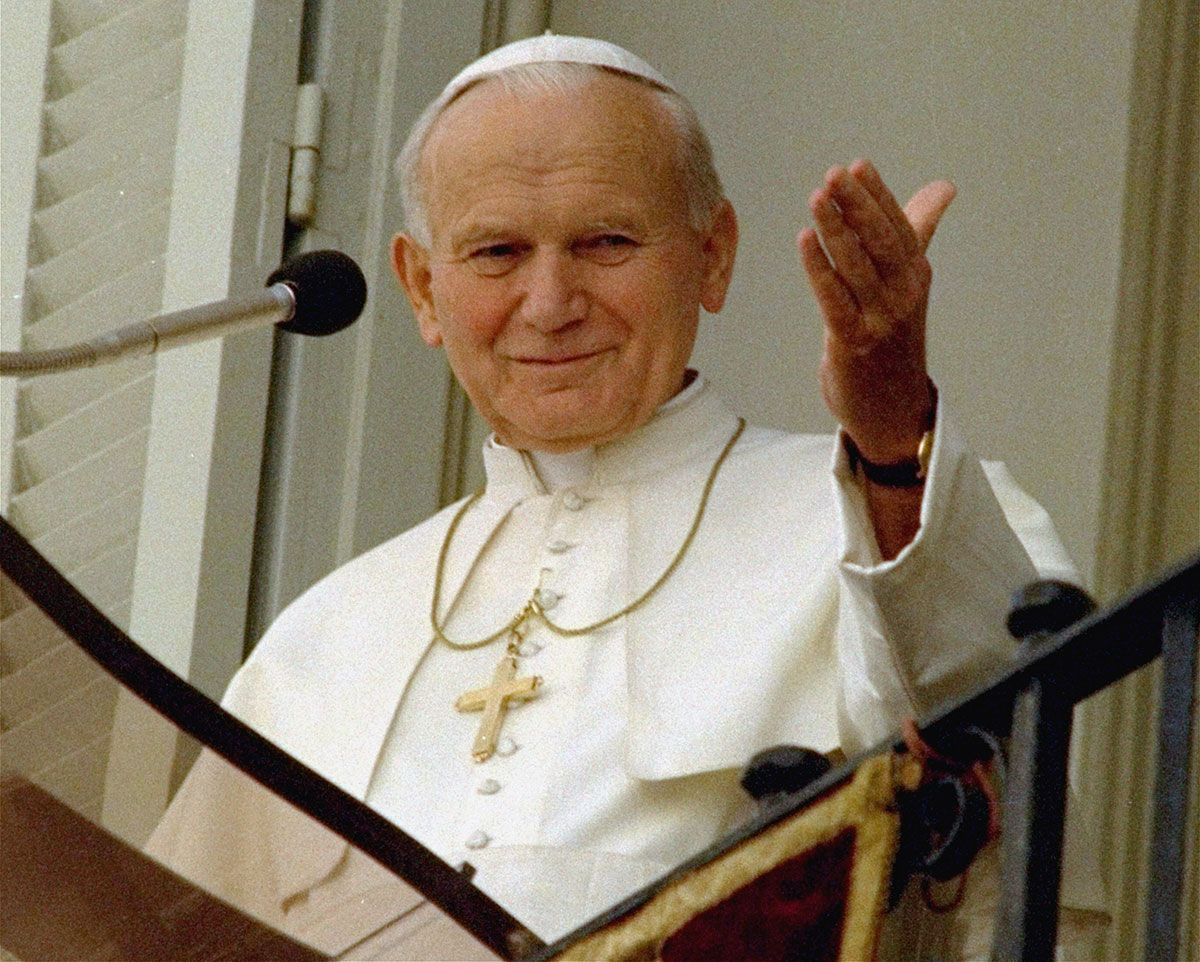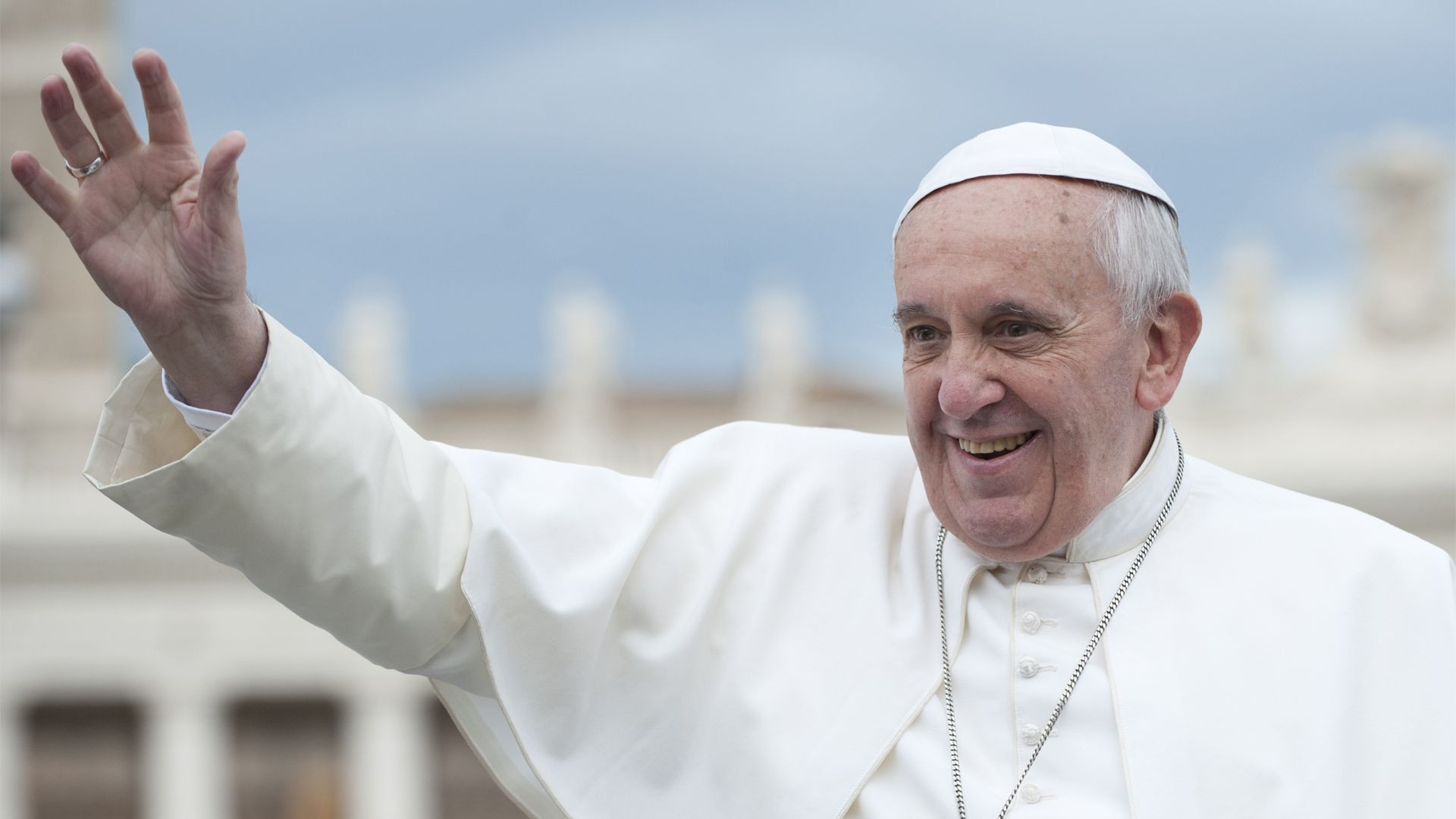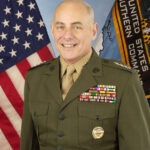St. John Paul II, born Karol Józef Wojtyła on May 18, 1920, in Wadowice, Poland, and passing away on April 2, 2005, in Vatican City, remains one of the most influential figures of the 20th and early 21st centuries. Serving as Pope from 1978 to 2005, his pontificate was the third-longest in the history of the Catholic Church and marked by profound global impact. He was not only the first non-Italian Pope in over four centuries but also the first Pope from a Slavic nation, breaking ground and changing the landscape of the papacy forever.
 Pope John Paul II waving to pilgrims, September 10, 1989
Pope John Paul II waving to pilgrims, September 10, 1989
Pope John Paul II greets the crowds of pilgrims during a public audience in Vatican City, showcasing his global appeal and connection with people from all walks of life.
A Pontificate of Global Reach and Influence
John Paul II’s papacy was characterized by an unprecedented outreach to the world. He embarked on numerous international trips, surpassing the combined travels of all his predecessors, in a dedicated effort to foster understanding between nations and religions. His influence extended far beyond the Catholic Church, as he became a vocal advocate against political oppression and a critic of Western materialism. He courageously issued apologies to various groups historically wronged by the Catholic Church, notably Jews and Muslims, in a gesture of reconciliation and healing.
His strong Polish identity and firm stance on nonviolent political activism played a crucial role in supporting the Solidarity movement in communist Poland during the 1980s. This movement ultimately contributed to the peaceful collapse of the Soviet Union in 1991, a testament to his global political impact. More broadly, St. John Paul II utilized his vast moral authority to champion human dignity and advocate for peace, leaving an indelible mark on global affairs. However, his centralized approach to church governance faced criticism from some clergy who perceived it as overly autocratic, and the Church also grappled with declining numbers of priests and nuns during his tenure. Furthermore, his traditional interpretations of Catholic doctrine on personal and sexual morality caused friction with some members of the laity.
Early Life and Formative Experiences
Karol Wojtyła’s early life was shaped by the tumultuous history of Poland. His childhood coincided with a brief period of Polish independence between world wars, a freedom that was soon overshadowed by the looming threat of Nazi Germany. Growing up in Wadowice, near the later site of Auschwitz, he experienced a community with a diverse population, including a significant Jewish presence, where pre-war anti-Semitism was reportedly minimal.
His father, Karol Wojtyła Sr., was a Polish army lieutenant. Tragedy struck early in his life with the death of his mother, Emilia Kaczorowska, when he was just eight, followed by the passing of his physician brother, Edmund, less than four years later. Despite these losses, young Karol was known for his outgoing nature combined with a serious disposition. He excelled academically and in drama, enjoyed playing soccer, and embraced a disciplined religious life under his father’s guidance. He served as an altar boy and was mentored in his faith by Father Kazimierz Figlewicz.
After graduating as valedictorian, Wojtyła moved to Kraków to study at the Jagiellonian University. His university life was interrupted by the Nazi invasion of Poland in 1939. The Nazi occupation brought immense suffering, with widespread killings and deportations targeting Jews, intellectuals, and clergy.
 How is a pope elected?
How is a pope elected?
A visual representation illustrating the complex process of papal election within the Vatican, highlighting the historical and procedural aspects of selecting a new Pope.
Wojtyła and his father initially fled east but returned to Kraków, where he continued his studies in secret. To avoid deportation, he worked in a factory for Solvay, a company deemed essential to the Nazi war effort. This experience made him the only modern Pope to have worked as a manual laborer. During this period, he engaged with Polish culture through writing nationalistic plays and joining the underground Rhapsodic Theatre, which aimed to preserve Polish identity through clandestine performances of poetry and drama. He was also deeply influenced by Jan Tyranowski, who introduced him to the mystical teachings of St. John of the Cross, emphasizing redemption through suffering and spiritual surrender. This encounter, alongside the example of his confessor Father Figlewicz, solidified Wojtyła’s conviction that the Church held a greater potential for positive change than even the arts.
The Call to Priesthood
A pivotal moment occurred in February 1941 when Wojtyła returned home to find his father deceased. This profound loss strengthened his spiritual resolve, and by autumn 1942, he had decided to enter the priesthood. While continuing his factory work, he secretly attended underground seminary classes organized by Kraków’s Cardinal Archbishop, Prince Adam Sapieha. In 1944, narrowly escaping a Nazi roundup, Wojtyła spent the remainder of the war hidden in the archbishop’s palace, disguised as a cleric. He later reflected that witnessing the brutality of the Nazi regime, including the murder of priests, clarified for him the true meaning of the priesthood.
In 1945, Soviet forces replaced the Nazis as occupiers of Poland. Wojtyła was ordained a priest by Cardinal Sapieha in November 1946. His first Mass, with Father Figlewicz assisting, was held in Wawel Cathedral, a symbolic location among Polish monarchs and national heroes. He pursued further studies in Rome, earning a doctorate in theology with a dissertation on St. John of the Cross. Returning to Poland in 1949, he served at St. Florian’s parish in Kraków, while also lecturing on philosophy and ethics. Over the following decade, he obtained a second doctorate, taught at the Jagiellonian University, and eventually became a professor at the Catholic University of Lublin.
During his early priesthood, he wrote poetry under a pseudonym, exploring religious, social, and personal themes. He also fostered a close-knit group of young adults, whom he guided spiritually and joined on outdoor adventures like kayaking and camping trips. These experiences contributed to his first book, Love and Responsibility (1960), a groundbreaking exploration of the positive aspects of sexuality within marriage, challenging traditional Church views that primarily focused on procreation.
His exceptional pastoral abilities and dynamism, even under communist restrictions, were recognized by Church leadership. In 1958, Pope Pius XII appointed him Auxiliary Bishop of Kraków. His impactful participation at the Second Vatican Council (1962-65) led Pope Paul VI to name him Archbishop of Kraków in 1963.
The Second Vatican Council exposed Wojtyła to critical contemporary issues facing the Church, including the role of the laity, interreligious dialogue, and the Church’s relationship with the modern world. Following the Council, he served on Pope Paul VI’s Commission for the Study of Problems of the Family, Population, and Birth Rate. His contributions are believed to have influenced Humanae vitae (1968), Pope Paul VI’s encyclical reaffirming the Church’s ban on artificial contraception. This encyclical proved to be highly controversial and widely disregarded, even within the Church, with some bishops privately suggesting theological flaws in the document and in Wojtyła’s perspective on the matter.
Legacy of St. John Paul II
St. John Paul II’s legacy is multifaceted and enduring. He is remembered as a transformative figure who revitalized the Catholic Church and played a significant role in global events. His emphasis on human rights, religious freedom, and interfaith dialogue resonated worldwide. He was canonized as a saint in 2014, solidifying his place as one of the most important figures in Catholic history. His impact on Poland, the fall of communism, and the modern papacy continues to be studied and celebrated, ensuring his enduring influence for generations to come.

